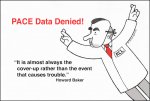Uh, no. It may be fundamentally disruptive to a very small segment of scientists in very specific fields and possibly geographical regions, but it's common practice in science in general. Why do you think there's so much outrage arising out of KCL's refusal to release data? On a weekend, no less.
Psychology, medicine, and possibly social sciences have always been the worst offenders in violating basic principles of transparency and reproducibility, and even those fields the idea of open data is not considered "fundamentally disruptive for science" by all researchers. I'd say not even close. I've spent my entire adult life around academics and I don't know a single one who is not in support of open data.
There will always be selfish and corrupt individuals, so regulation rather than relying on accepted practice is a good idea. Codifying what is generally standard practice does not imply the practice is resisted by the majority. It just means the dirty minority need to be forced to do the right thing... just like with social justice laws.
Open Data as I understand it certainly hasn't been 'common practice' in science, at least until the last 5 or 10 years. It has long been understood that it's an important principle in science, but it was only in 2004 that OECD members signed the declaration that it should become mandatory for all publicly-funded research - and the PACE trial's funding was approved only shortly
before the MRC got its policy and procedures in place to make open data a mandatory requirement for grant approval (I think I'm right in saying that if the PACE researchers had applied for funding a year or so later than they did, they would have been compelled to share the data as a matter of course, just like everyone else has to nowadays). This accident (or not) of timing may perhaps explain why they seem like such dinosaurs right now. The open data rules that came in soon after they began the PACE odyssey may finally be catching up with them.
I spent about a year researching and working in the area of Open Data, in an IT context, only 2 or 3 years ago, and it was clear then that everyone was still in the relatively early stages of working through the quite radical practical implications and technical difficulties involved in publicly sharing their data. We may have our wires crossed, but what
I'm talking about is certainly a relatively recent development. The
wikipedia article on Open Data is reasonably good on this; it does explain how the internet age is in the process of changing what we mean by 'open data'. I'm not as familiar with what was common practice in the past, in a variety of countries and contexts, in terms of researchers sharing their data with each other, but the publications themselves, let alone the data, were certainly not freely available and readily accessible to the public in the past, and that's what I understand by Open Data.
I agree that the practice of open data has not been resisted by the
majority of practicing scientists (and I didn't say it had been), but it has been resisted by many journals, academic institutions and academics who have a variety of vested interests - and yes, in some cases, dodgy research - to protect. The whole debate is not necessarily only about dodgy science though; the wikipedia page I linked to sets out a list of arguments for and against open data, which clearly illustrates that there is an ongoing debate about where the lines should be drawn. It's a matter of opinion as to whether everyone arguing against open science is dodgy and corrupt, and personally I don't think I would go that far. I think many of them are just wrong.




